September finds SEOs on some shaky ground. A lot of updates have come in a short amount of time and not all of them were announced. This roundup covers some of the updates, plus the latest in SEO tricks and news.
First, you’ll learn all about the link-building strategy that could get you links from powerful sites like BBC.com and Vice.com. Next, we have a deep analysis of the title tag update that may cover more than you’ve heard. Then, we’ll follow with a study on how category descriptions impact optimization.
Next, we’ll cover some of the month’s most actionable guides. The first writer puts forward his personal list of nearly 20 SEO boosting practices. Then, you’ll learn how to calculate ROI with Google Analytics and whether exact match domains work anymore.
Finally, we’ll look at the news. It’s all Google this month. You’ll learn how they’ve changed generated titles, completed the experience update, and (oops) admitted to losing a few days of your data.
What is Digital PR? Why It Matters in Quality Link-Building
Starting this list is a guide I wrote for Authority Builders on how to use Digital PR to give your website a serious boost in the SERPs.
Digital PR is a marketing strategy that helps you build high-authority dofollow links to your website from real news articles on powerful sites. A solid Digital PR campaign can see you land dozens of killer links from some of the biggest sites on the web.
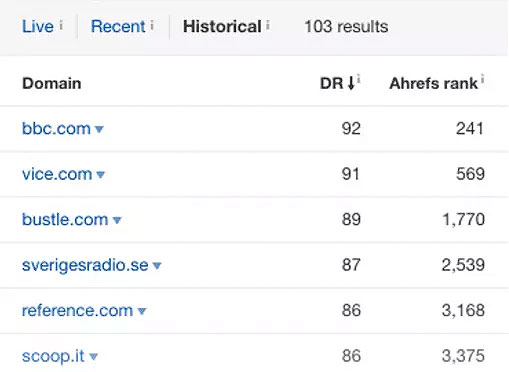
In the guide, I walk you through exactly what Digital PR is, and how it differs from Traditional PR and Press Release Link Building. I then walk you through, step by step, the strategies you can use to land these kinds of links for yourself.
You’ll find out:
 How to discover newsworthy content
How to discover newsworthy content Tips to creating content that journalists love
Tips to creating content that journalists love How to identify outlets and journalists to partner with
How to identify outlets and journalists to partner with My go-to strategy for creating and distributing your Press Release
My go-to strategy for creating and distributing your Press Release What to do to ensure the success of your Digital PR campaign
What to do to ensure the success of your Digital PR campaign
In this next case study, you’ll learn more about the recent Google Title Tag update and how it affects us SEOs…
Google Title Tag Update: A Highlight for Extraction Methods & Approaches to SEO
https://brodieclark.com/google-title-tag-update/
Brodie Clark brings us this look at the title tag update and includes a small case study that demonstrates how it works right now.

He begins with a quick history of how title tags have changed. As he points out, Google has done plenty of experimentation with features like the pixel limit. Google also has spent the last few years modifying and replacing snippets at will.
So what changed with the most recent update on the 17th/18th of August? Google appears to have updated how they choose title tags. Brodie found that the new ones tended to be shorter. They tend to remove locations (if there are more than one) and add brands at the end.

The SEO Lily Ray was responsible for the case study at the end. She bore down on one page that changed its title and chose the words from outside the page. Eventually, she found that the new title had been pulled from a tag page.
You may be waiting to hear what changes you have to make to your site. Brodie didn’t have any advice on optimizing your site for this update.
Our stance is that we’re going to wait and see. We have a lot of tests running right now to determine the best way to optimize title tags with the update in place. Stay tuned.
Our next case study also deals with content that may be too long. It’s a case study that looks at the impact of removing fluffy category content.
The Short and Long-Term Ranking Impact of Removing Long and Fluff E-Commerce Category Descriptions [Case Study]
https://www.gsqi.com/marketing-blog/ecommerce-category-description-case-study/
Glenn Gabe brings us this in-depth case study into the actual SEO performance of category descriptions.
Imagine you have an e-commerce site with a lot of different categories. For a while, SEOs were recommending that you provide tailored content for each page. You knew people would probably never read the content, but the point was to provide context clues for search engines.
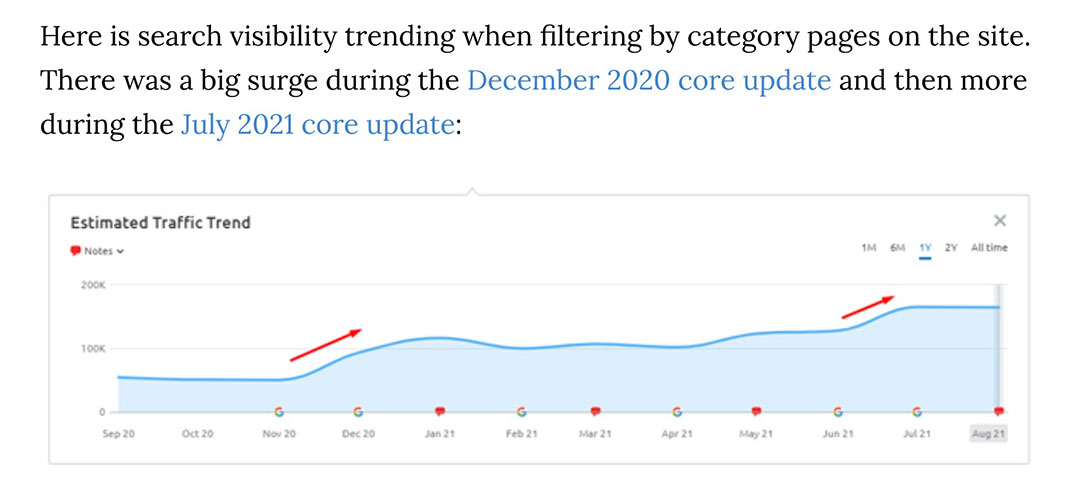
Glenn uses this study to take a second look at whether this work really matters. Are we helping search engines give meaning to hundreds of pages, or are we just annoying our readers with a lot of content they don’t want?
The study involved an e-commerce site that was updated in stages over several years to watch the effects. In the first phase, the descriptions were all cut to about 30% of their original size. In later phases, they were cut to a single paragraph.
The case study found that cutting down descriptions didn’t have any short-term effects. The rankings held. Over the long period, the pages all experienced regular growth to the point that many now rank #1 with no other changes.
With the case studies out of the way, we’ll move on to the month’s guides. We’ll start with one SEOs list of his favorite techniques.
19 Ways to Increase Organic SEO Traffic (With Examples and Templates)
https://www.robbierichards.com/seo/increase-organic-traffic/
Robbie Richards brings us this look at his favorite 19 methods when a site needs a traffic boost. He covers a lot of the most popular ways to get a site moving. However, even experienced SEOs may pick up something new from this list.
Prevent (and remove) keyword cannibalization
Eliminate “organic anchors” with a data-driven content audit
Find quick-win keyword opportunities
Perform subfolder keyword analysis
Target the long tail for faster gains
Use modifiers to find high-value keyword opportunities
Expand your organic footprint with secondary keywords
Boost authority with internal linking
Land featured Snippets
Create Content Silos and AVOID Orphaned Pages
Identify high-volume keyword gaps
Use “Barnacle SEO” to boost SERP visibility
Perform on-page gap analysis
Use “Parasite SEO” to Rank for Ultra-Competitive Keywords
Each method is explained step-by-step. You’ll see images of how your templates should change as you’re putting each of the steps into practice. If any of them are new to you, take this chance to pick up some solid strategies. They’re up-to-date, and Robbie will let you know exactly how to pull them off.

If these methods work for you, you’ll also find the next guide helpful. It teaches you some ways you can calculate your SEO ROI just by using Google Analytics.
How to Calculate Your SEO ROI Using Google Analytics
https://moz.com/blog/calculate-seo-roi-with-google-analytics
Adriana Stein of Moz brings us this guide on how to measure SEO ROI using some figures that you can find in your Google Analytics console. As Adriana points out, GA is worth using because it helps you break down your audience, set goals, and work toward improvements.
She breaks down several figures you can use to calculate ROI from Google Analytics. Let’s use the first one as an example.
First, she covers page value. This measurement assigns an average monetary value to all pages viewed in a session where a transaction occurred. It helps measure pages that are important for your site but aren’t where conversions take place.
Adriana provides a formula you can use to put a base dollar value on your pages based on its role in the conversion process. Using that information, you can show that the page either improved or declined based on SEO actions that were taken.
The rest of the guide will take you through the other measurements, including several that make the most of e-commerce tools in GA.
For now, we’ll check back with one of SEO’s (former) most popular practices. Do exact match domains work anymore?
Do Exact Match Domains Still Work Anymore?
https://www.searchenginejournal.com/do-exact-match-domains-still-work/283759/
Winston Burton of Search Engine Journal brings us this look at whether exact match domains (EMDs) are worth the premium cost in modern SEO.
EMDs are domain names that match the keyword the site is targeting. For example, an EMDs for a New York City barber would be www.NYCbarber.com.
These domains had a reputation for delivering easy SEO gains in the past. The logic was that if your domain perfectly matched a keyword/phrase, Google would recognize your site as being relevant to that phrase faster than a site by another name.
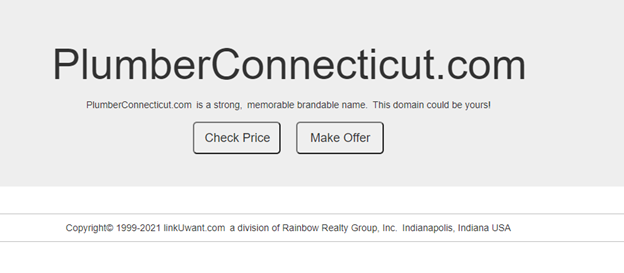
Winston argues this argument is dead at this point for several reasons. For one, Google updates have targeted the relationship between “spammy” domain names and ranking in several updates. There’s no reason now to think the relationship is strong enough to matter.
Second, Winston points out, EMDs are most applicable to local results, and domain names are barely applicable there. Instead, sites rank based on their map placement and content’s compatibility with SERP features.
Winston says EMDs can still be valuable, but they need to be researched for the impact they will have on your customers before you pay any extra. Many of the EMDs that can benefit are already owned, and usually expensive.
I agree that they still work. However, I choose not to purchase them very often for a couple of reasons.
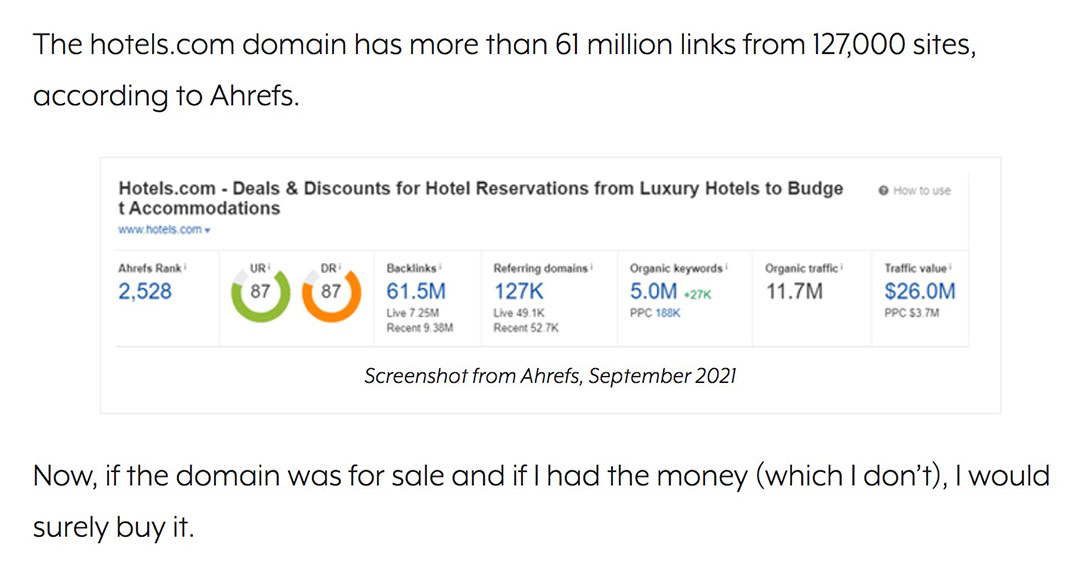
First, they cap out the content you can talk about on your site. Imagine that you create a page that’s a little outside the site topic but performs shockingly well. In some cases, you’d want to pivot the whole site around that page now that you know the appetite is there. You don’t have that flexibility with an EMD. If you want to go off-topic, you’ll be fighting uphill for relevance.
Second, EMDs are harder to sell. The lack of flexibility means more risk for buyers that market changes could make the site worthless.
That closes out the guides. The news is coming next. First, we’ll look at Google’s official confirmation of the title’s update.
Google Confirms It Changed How It Creates Titles for Search Result Listings
Barry Schwartz brings us this look at Google’s title announcement. Google has declared that they introduced a new system of generating titles for web pages.
We delved into Google’s title update in our first case study. This news release gives us our first insight into how and why Google made the changes. To start, Google provides us some more information about where information for titles is found.
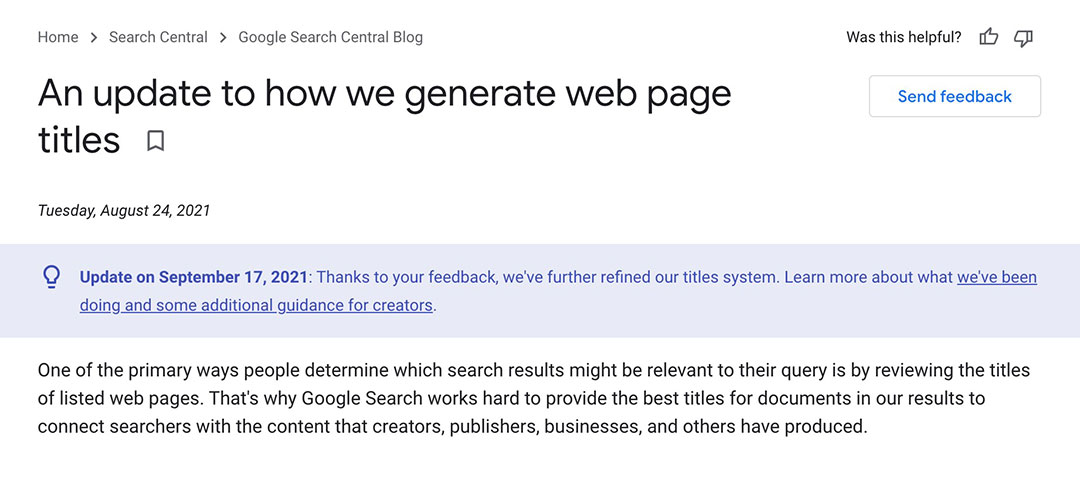
Previously, the search engine was using the query the searcher entered into the box to form the titles. Sometimes it would find a piece of the page that included those terms and replace the existing title with that snippet.
Now, however, Google has announced a new change that will ensure that the titles generated are as close to the topic of the page as possible. The company has clarified that HTML tags are still the primary source (80%) for producing titles.
They have claimed that the changes were necessary to produce titles that were more readable and accessible. They also argued that the change could relieve user frustration with long, clipped, or otherwise annoying titles.
Google is doing a lot to consider the user experience, lately. In our next new item, we’ll look at what it means that the Google Page Experience update is fully live in search and top stories.
Google Page Experience Update Fully Live In Search & Top Stories
https://www.seroundtable.com/google-page-experience-update-done-rolling-out-32034.html
Barry Schwartz breaks down this announcement by Google that the experience update is fully complete. The news came on Sept 2, nearly two months after the original announcement that the update was being rolled out.
This update (among other things) will create a new “Page Experience Report” in your site’s Search Console. This report will give you some insight into what Google thinks of your page and why you may not be ranking.
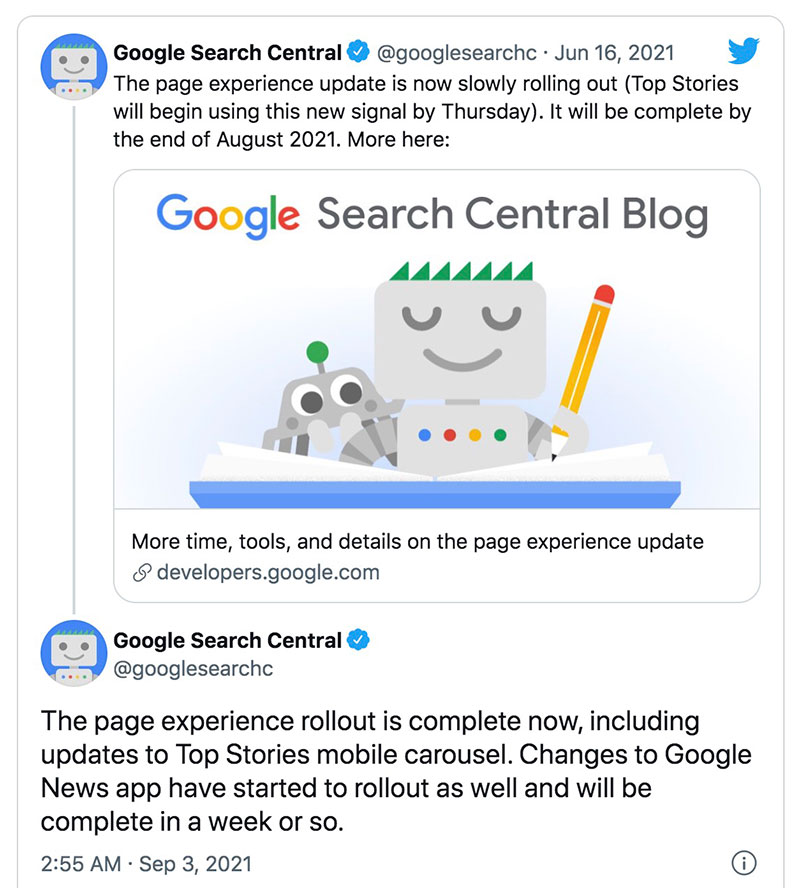
While this update took a long time to complete, it doesn’t necessarily mean big changes for the industry. Barry links to some analysis of ranking shifts, and the consensus seems to be that no sites were notably “hit” by the conclusion of this update.
For now, check out your page experience score and start planning for your next steps. Now that the update is out, we should have some case studies that break it down very soon.
Google Loses Search Console Performance Data
https://jamiemckaye.com/google-loses-search-console-performance-data/
Jamie McKaye brings us this look at Google’s “my bad” of the month. If you’ve noticed that you’ve lost a few days of Search Console data in August, you can stop looking for it. It’s gone, and it’s not coming back.

The issue affects Search and Discover data that was collected on August the 23rd & 24th. Google reports that the data is completely lost, and blames the problem on an internal error.
For most SEOs, the lost data isn’t a big deal. If you were at one of the agencies sending reports out to clients around the end of the month, it was probably a little more maddening. The lost data created staggering drops in performance reports until the problem was announced.
Got Questions or Comments?
Join the discussion here on Facebook.



